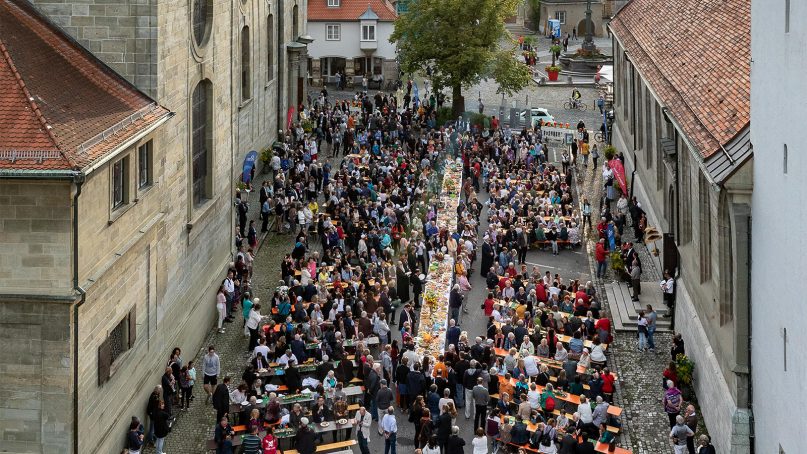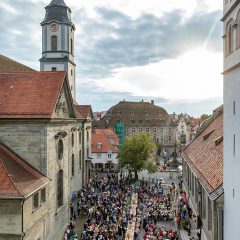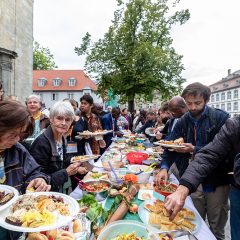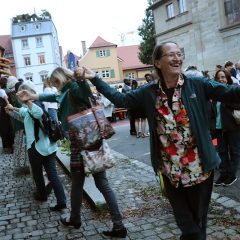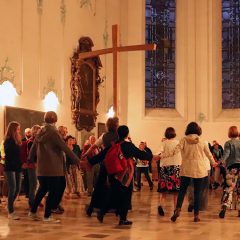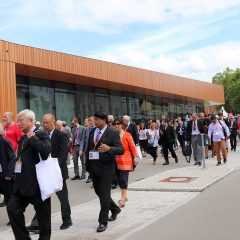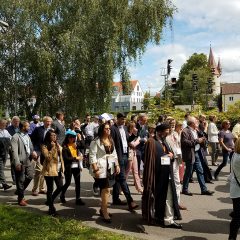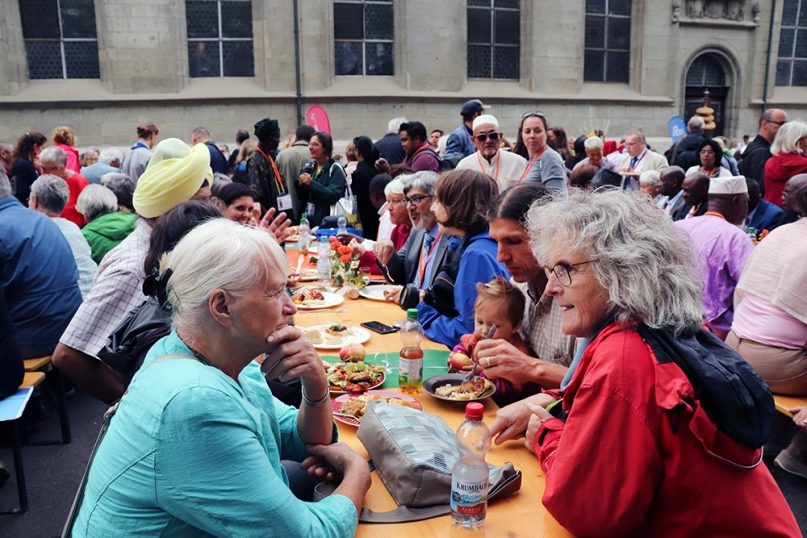
People visit during a communal meal hosted by Religions for Peace on Aug. 21, 2019, in Lindau, Germany. RNS photo by Adelle M. Banks
LINDAU, Germany (RNS) — Over a picnic table, sandwiched in between Catholic and Lutheran churches on cobblestone streets, Christians of this Bavarian town chatted with Buddhists from Indonesia and Thailand.
Angela and Christian Feustel, Lutherans from the town near the borders of Switzerland and Austria, brought figs from their backyard for a “long table” dinner Wednesday (Aug. 21) with delegates from Religions for Peace, a global interreligious group holding its 10th World Assembly in the community.
“I think it’s very, very good,” said Angela Feustel. “And I hope it’s not only words but some effect. But I think one effect is to be together and to eat together.”
RELATED: Woman chosen to lead Religions for Peace as others urge greater female visibility
During breaks in their four-day meeting, many assembly delegates found time to explore the town of about 25,000 people. Some worshipped in the early mornings together in the Catholic cathedral where a Lutheran pastor from across the street preached.
And on one night delegates ate and drank over long picnic tables near the two churches.
Somboon “Moo” Chungprampree, from Thailand, and Philip K. Widjaja, from Indonesia, sat next to the Feustels at the dinner.
Chungprampree used almost the same language as his tablemates to describe the outdoor common meal in the town’s Market Square.
“It’s very good,” he said.
- Religions for Peace hosted a communal meal in Lindau, Germany, on Aug. 21, 2019. Photo by Christian Flemming/Religions for Peace
- The Religions for Peace conference hosted a communal meal in Lindau, Germany, on Aug. 21, 2019. Photo by Christian Flemming/Religions for Peace
Then, pointing to a green, yellow and black bottle of “Lindauer Hell,” he added jokingly: “We can talk and communicate to learn about the locals, local beer, atmosphere, everything about the conflict in churches.”
Franz Stiehle, a lifelong Lindau resident, and his wife, Ellen, brought wraps made with chicken or with vegetables, thinking of the faith groups that eschew pork or beef because of their dietary laws.
“It’s very necessary,” he said of the event that brought the world of faiths to their small island community. “And the whole world has to have peace.”
RELATED: International interfaith gathering: ‘We must work together or we will all fail’
For some delegates, the meal was a chance to talk about issues beyond religion and find something perhaps unexpected in common.
The Rev. Aiah Foday-Khabenje, the general secretary of the Association of Evangelicals in Africa, said he met a local woman who teaches German and who recalled her experience visiting Africa when she was a girl.
“When people meet, you can discover something new,” said Foday-Khabenje, a delegate from Sierra Leone, who said they just spoke briefly about religion because he learned that she was irreligious and “still searching.”
Eating and talking were the main activities for more than 700 people who took part in the two-hour dinner event. But a couple dozen people added dancing to the mix.
- People dance during a communal meal hosted by Religions for Peace in Lindau, Germany. RNS photo by Adelle M. Banks
- People encircle a wooden cross at St. Stephen’s Lutheran Church in Lindau, Germany. RNS photo by Adelle M. Banks
As Sirtaki, Greek dance music, played in the background, people held hands and twisted their feet as they walked around the tables and ended inside St. Stephen’s Church, a Lutheran congregation. They concluded by encircling a wooden cross and applauding their time together.
Ulrich Schneider, managing director of the Foundation Peace Dialogue of the World Religions and Civil Society, which partnered with Religions for Peace to convene the assembly, was pleased that the event brought so many religious leaders and locals together.
“This is exactly what we wished,” he said. “We don’t always know if wishes come true, but this wish came true.”
He noted that an even larger goal remains to be accomplished: the preservation of houses of worship at a time when they have been attacked across the globe.
- Participants process away from Inselhalle, the venue for Religions for Peace 10th World Assembly, on Aug. 21, 2019, in Lindau, Germany. RNS photo by Adelle M. Banks
- Religions for Peace participants parade through Lindau, Germany, to dedicate the Ring for Peace sculpture on Aug. 21, 2019. RNS photo by Adelle M. Banks
On the same day that the faith leaders dined in the middle of the town, many of them also processed to a park off Lake Constance to dedicate a large wooden sculpture in the shape of a ring at a ceremony that highlighted the importance of protecting the sacred spaces where people of a range of faiths worship.
“We want to protect holy sites in all religions and worldwide,” Schneider said. “And we hope that we can be successful.”
Members of the U.S. delegation, who posed for a photo next to the new sculpture, were struck by what they saw as an enduring symbol of peace as well as the generosity of the town that permitted their interreligious organization to place it there.
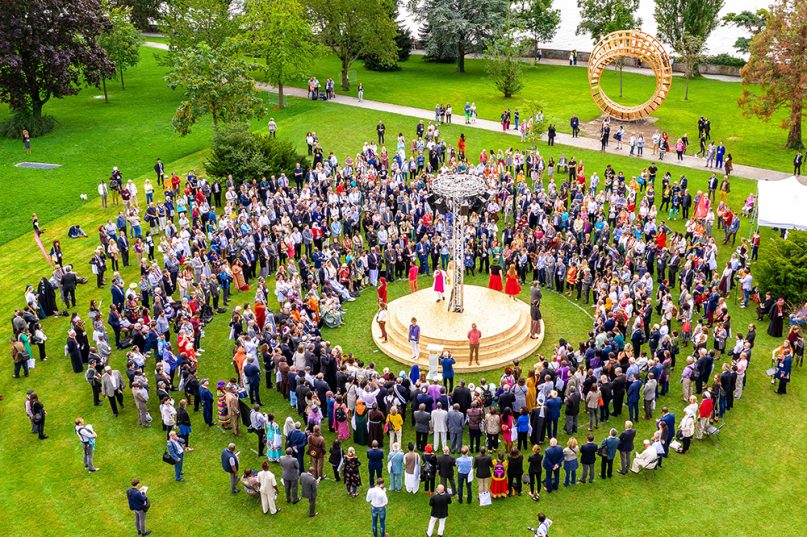
Religions for Peace ceremony for the Ring for Peace in Lindau, Germany. Photo by Christian Flemming/Religions for Peace
“We build in every part of the world war memorials,” said Homi Gandhi, president of the Federation of Zoroastrian Associations of North America. “This is the first time I’m seeing a memorial to the peace, a memorial to celebrate interfaith peace and dedicated to that.”
Lynnaia Main, the Episcopal Church’s representative to the United Nations, said she was most inspired by the townspeople’s role in allowing this sculpture to be placed as a permanent monument in their locale.
“It’s the people of Lindau who have made this a sacred site for us in receiving us and welcoming us,” she said.
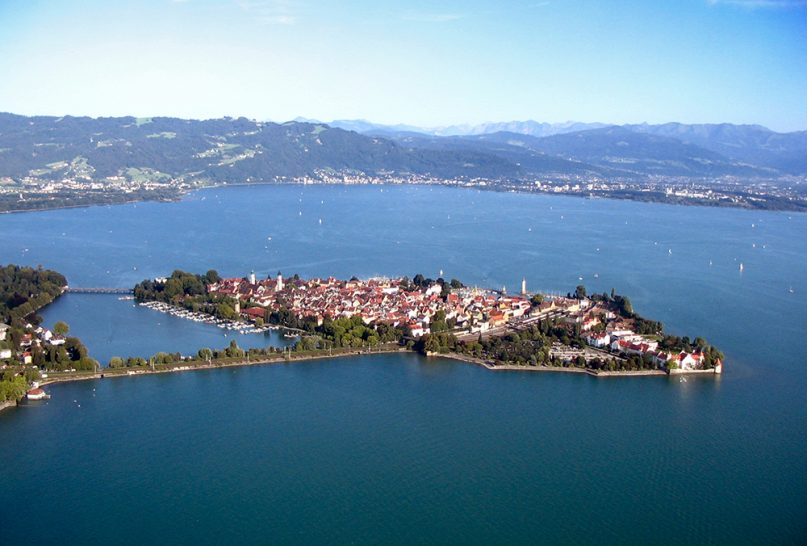
An aerial view of Lindau, Germany, on Lake Constance. Photo by Edda Praefcke/Creative Commons
